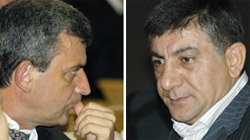They discussed issues concerning the economical situation in our country and the expectations in next year. They said that at this point in time this year was OK. They both think that in this past year we had stable economical growth and it will continue next year.
Anyway, Mr. Sukiasyan spoke about an obstacle for development in our country: bureaucracy. “If a physical person makes a deal with another physical person, or a juridical person makes a deal with another juridical person, everything goes perfectly. In this case all arrangements are done well and in time, in a word everything goes well. But as soon as a juridical person or a physical person tries to make a deal with any state body, everything goes wrong. Humans are not respected, they can ignore people, they can make them leave and don’t serve them, and people leave everything and go away”, said Mr. Sukiasyan.
As for Mr. Minasyan, he thinks that the main prerequisite for economic development is the protection of free competition: “Economical relations are as good as the strong competition. There is nothing more important than economical competition”, said Mr. Minasyan.
Journalists asked them about the foreign transfers made to our country, which according to the CB head Tigran Sargsyan covered one billion dollars. Journalists asked them how much of an impact could these transfers have on the formation of demand and supply in our country. In other words, they asked how much these transfers could influence on the development of our economy.
Actually when publishing this information in the press they mean that Armenia survives only with these transfers (especially from Russia and the US). They said that one billion is not such a big sum in comparison with the GDP of our country. Mr. Sukiasyan said that almost all countries received transfers; he also said that this sum covered 600 million dollars in Georgia. By the way, we send as much money outside as much receive, because the negative balance of export and import is still big. G. Minasyan said that in that field we had a positive tendency too. “Of course the negative balance is big, but if we compare this mark with the GDP, we will see that it has a tendency to reduce. In 2001, when the trade negative balance covered the 25 % out of our GDP, it was reduced twice in 2005 up to 12 %”.
They also discussed the issue of gas price increase. The gas price increase may bring to inflation, which will have an influence on our product competency in the international market, as well as on our export. Mr. Sukiasyan thinks that everyone will feel this difference, particularly exporting producers, but generally the negative results will not be so much. Mr. Sukiasyan thinks that there are positive things in this increase too: “If the price for gas was artificially law, we can say that the normal market price is a positive appearance for us, because now a lot of organizations will start to think about new sources of energy and making investments in them. Currently, when the prices are artificially law, these sources are not so attractive. I think we will have serious developments here in 2008”.
G. Minasyan agreed with his colleague: “This supports the formation of strong competition”. But the problem is that whether these prices are market prices or competition prices. The problem is that for instance whether our producers that will pay 110 dollars for gas can compete with the producers of Belarus that pay 48 dollars for gas. Mr. Minasyan said that the price increase didn’t depend on them (the government): “But we have three important resources that will help us resist this: the gas pipe line from Iran, for which we will pay with the energy we produce, the exploitation of the fifth block of Hrazdan power station, which can produce energy for very low prices in case of applying the necessary facilities there, and the power station of Yerevan, which has modern technical Japanese facilities”, said Mr. Minasyan. He also said that it was important to construct windmills and small power stations too.
The head of the economical commission also spoke about journalists: “Some newspapers write awful information regarding the price increase. Those prices are not final yet. The commission must inform everyone about the price increase 100 days prior to the increase date. So don’t get ahead of time. You shouldn’t frighten people. It is better for us to speak about the possible ways to resist this influence and not to frighten people. The fourth power must lead people in a right way”, said Mr. Minasyan.
Here we have to also discuss some issues. First of all if they say that the price increase will not seriously affect our economy, why did the authorities do their best one month ago to deny that news? If the final prices are not fixed yet, why do Russian officials and the “Gasprom” management team announce that they have set one price for all the countries in the region (110 USD)?
As for frightening people, most answers frighten people more than what journalists say. As for speaking only about good things, the government is the only one that can do this, otherwise it will seem to people that print media advertises the government.
In regard to this, Mr. Sukiasyan didn’t agree with his colleague and said that the authorities are the ones to work out and realize solutions, not the public.
Our country can resist the price increase in the coming years with the help of the mechanisms Mr. Minasyan mentioned. But what can the government do in connection with this except the credit program offered by Russia? Answering to this question Mr. Minasyan offered again not to get ahead of time: “We don’t have to take credit from Russia, we can take credits from international institutions too, for example, from the World Bank”.

